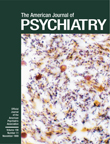Seasonality Associated With the Serotonin Transporter Promoter Repeat Length Polymorphism
To the Editor: The propensity of people to exhibit changes in mood and behavior with the changing seasons, also known as seasonality, has been found to be heritable (1). Seasonality can be viewed as a continuum ranging from those who show no seasonal changes to those who exhibit extreme changes with the seasons (1). Seasonal changes in serotonin metabolism might be responsible for seasonally dependent behaviors (2).
We previously reported that the short allele of the serotonin transporter promoter repeat length polymorphism is associated with seasonal affective disorder, and in patients with seasonal affective disorder, the short allele is associated with higher levels of seasonality than in those with the long allele (3). We recently explored the association between the serotonin transporter promoter repeat length polymorphism and seasonality in a general population study group. We received written informed consent from all subjects.
We administered the Seasonal Pattern Assessment Questionnaire (4) to 209 Caucasian individuals who were selected from the general population, which is described elsewhere (5). We computed global seasonality scores from the Seasonal Pattern Assessment Questionnaire, which are the sum of the scores on items pertaining to self-reported seasonal changes in mood and behavior and evaluated their serotonin transporter promoter repeat length polymorphism genotypes. Knowing that the short allele has been found to act in a dominant fashion (5), and on the basis of our results in patients with seasonal affective disorder (3), we hypothesized that those individuals who had at least one short allele would have higher global seasonality scores than those who were homozygous for the long allele. Our hypothesis was borne out: the global seasonality mean score for the long-long genotypes was 6.2, SD=3.9, and the mean score for the non-long-long genotypes was 8.9, SD=4.9 (t=3.65, df=207, p<0.001). There was no difference in seasonality mean scores between those who were heterozygous and those who were homozygous for the short allele (short-long=9.2, SD=4.6; short-short=7.9, SD=5.7). Thus, the serotonin transporter promoter repeat length polymorphism appears to influence the development of seasonality; higher seasonality scores occur in those with at least one short allele.
1. Madden PA, Heath AC, Rosenthal NE, Martin NG: Seasonal changes in mood and behavior: the role of genetic factors. Arch Gen Psychiatry 1996; 53:47–55Crossref, Medline, Google Scholar
2. Rosenthal NE: The mechanism of action of light in the treatment of seasonal affective disorder (SAD), in Biological Effects of Light. Edited by Holick MF, Jung EG. New York, Walter de Gruter, 1995, pp 317–324Google Scholar
3. Rosenthal NE, Mazzanti CM, Barnett RL, Hardin TA, Turner EH, Lam GK, Ozaki N, Goldman D: Role of serotonin transporter promoter repeat length polymorphism (5-HTTLPR) in seasonality and seasonal affective disorder. Mol Psychiatry 1998; 3:175–177Crossref, Medline, Google Scholar
4. Hardin TA, Wehr TA, Brewerton T, Kasper S, Berrettini W, Rabkin J, Rosenthal NE: Evaluation of seasonality in six clinical populations and two normal populations. J Psychiatr Res 1991; 25:75–87Crossref, Medline, Google Scholar
5. Lesch K-P, Bengel D, Heils A, Zabot SZ, Greenberg BD, Petri S, Benjamin J, Miiller CR, Hamer DH, Murphy DL: Association of anxiety-related traits with a polymorphism in the serotonin transporter gene regulatory region. Science 1996; 274:1527–1531Google Scholar



